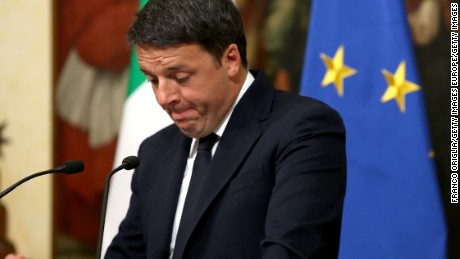(CNN)Now it's Italy's turn for uncertainty.
By a large margin, Italian voters rejected a constitutional referendum on the reform of the parliamentary system that Prime Minister Matteo Renzi, of the center-left Democratic Party, had staked his reputation on.
It's a huge victory for the Five Star Movement founded by comedian turned populist politician Beppe Grillo, who compares himself to Donald Trump and has shown a similar genius for marketing -- in this case through his blog.
As happened with the outcomes of the Brexit vote in Great Britain and the Presidential election in the United States, this "No" vote carried with it an element of protest quite beyond the complicated political system reforms at hand.
Italy's uncertain future
What does this outcome mean for Italy, and how does this vote add to the trending illiberalism within Europe?
Renzi had vowed to resign if a "No" vote prevailed, turning the referendum into a plebiscite about his leadership, which grew increasingly unpopular due to the ailing economy.
Now it's very likely that Italy will hold elections that could result in what was previously unthinkable: the anti-establishment, and anti-European Union Five Star Movement at the pinnacle of the state, and more power for the right-wing Northern League party as well.
The reforms proposed by the 41-year-old Renzi aimed to streamline Italy's government, which is surpassed only by Greece on most indexes of inefficiency.
He envisioned (among other things) reducing the size and power of the Italian Senate (right now both House and Senate have equal approval rights on legislation), and a greater centralization of the energy, transportation, and infrastructure sectors.
Renzi's critics, which include many Italians on the left, saw the reform as a power play that would remove checks and balances crucial to a healthy democracy.
Many of the particularities of Italy's political system (such as decentralization) date from a 1948 Constitution written in the aftermath of two decades of rule by Benito Mussolini and designed to prevent the return of dictatorship. It would be a true irony if the vote against changing this anti-Fascist Constitution ushered in a new period of rightist politics in Italy.
At the moment, how a Five Star government would look and act is far from clear.
Founded in 2009, it became a political force to contend with when it received more than 25% in the 2013 elections. Yet its platform is still so eclectic that it's been called "post-ideological." It draws in large numbers of young people for its support of web-based democracy, the environment, and sustainable development, and its harsh critiques of globalization and big business.
Yet the Five Star Movement certainly does not map onto progressive politics as traditionally defined. Five Star members are economic protectionists, partial to conspiracy theories, and take a hard line against Islam and immigration.
Grillo's corrosive comedy has included a "joke" that Sadiq Khan, London's Muslim mayor, might "blow himself up in Westminster."
And while the party's mantra is direct democracy, Grillo has a rather dictatorial personality. Perhaps that's why he adds his name to the many European politicians who admire Vladimir Putin (the Italian newspaper La Stampa reported that Russian sites were spreading fake news designed to help Grillo).
source: edition.cnn.com















0 comments:
Post a Comment